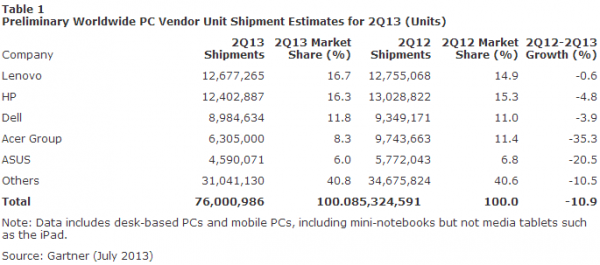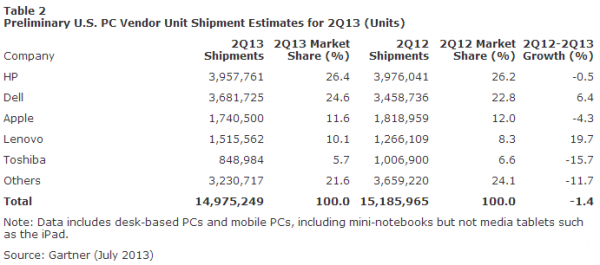Don't blame Windows 8 for terrible PC shipments

It's no secret that the PC market has slowly taken a turn for the worse. And, if we're to believe what research company IDC said in late-May, it's not going to get any better anytime soon, with shipments predicted to drop even further, by 7.8 percent this year. Furthermore, tablets are expected to out-ship PCs by 2015. Unquestionably, the future appears gloomy but, according to Gartner, the culprit is not the controversial Windows 8, as some pundits believe.
Gartner just released its latest report on the state of the PC market, which shows that Q2 2013 shipments -- which top 76 million units from all vendors, combined -- have declined by 10.9 percent compared to the same period, last year (when shipments exceeded the 85.32 million mark). "The sharp decline in the second quarter of 2013 was partly due to the shift in usage patterns away from notebooks to tablets, and partly because the PC market was exposed to inventory reductions in the channel due to the start of the transition to new Haswell-based products", says Gartner principal research analyst Isabelle Durand.
Despite Intel's and Microsoft's push towards popularizing touchscreen laptops, the market has yet to positively respond to the new type of devices. "Touch-based notebooks still account for less than 10 per cent of the total consumer notebook shipments in the last quarter", says Durand.
As previously mentioned, some pundits blamed Windows 8 for not providing any boost in PC shipments. Microsoft's latest operating system was highly criticized, mostly for its lack of a Start menu and the introduction of the Modern UI (User Interface), that are believed to alienate those who use traditional PCs (that do not feature touchscreens).

"While Windows 8 has been blamed by some as the reason for the PC market's decline, we believe this is unfounded as it does not explain the sustained decline in PC shipments, nor does it explain Apple's market performance", says Gartner principal analyst Mikako Kitagawa.
Aside from HP and Dell, Apple was the vendor least-affected by the decline of the US PC market (where shipments surpass 14.97 million units) in Q2 2013, its sales fell by 1.4 percent compared to the same period, last year (when shipments exceeded 15.18 million units).
HP shipped 3.95 million PCs in the US, which translates into a 26.4 percent market share. Dell follows with 3.68 million units and 24.6 percent, respectively. Apple takes the third place, having shipped 1.74 million PCs, which account to 11.6 percent of the corresponding local market.

So what are the (other) reasons why PC shipments are not recovering? "We are seeing the PC market reduction directly tied to the shrinking installed base of PCs, as inexpensive tablets displace the low-end machines used primarily for consumption in mature and developed markets", says Kitagawa. "In emerging markets, inexpensive tablets have become the first computing device for many people, who at best are deferring the purchase of a PC. This is also accounting for the collapse of the mini notebook market".
In the US, Kitagawa says that the decline can (also) be pinned on the professional market. "Our preliminary results indicate that this reduced market decline was attributed to solid growth in the professional market. Three of the major professional PC suppliers, HP, Dell and Lenovo, all registered better than U.S. average growth rate. The end of Windows XP support potentially drove the remaining PC refresh in the U.S. professional market".
But another reason, that is not mentioned by Gartner in its report, as to why PC shipments are not recouping is the technological advancement that drove a major performance leap over the past years (and, even, decade). PCs that were sold during the time Windows Vista was released are more than capable of handling any of the the operating system's successors (Windows 7, Windows 8 and, in the coming months, Windows 8.1). Users who do not want a faster system can pretty much keep their old devices (case in point is my five-year old HP 8710p laptop) and enjoy the latest software benefits (bar high-end games) with little to no extra money spent on upgrades. Because of this, to some extent, the decline of the PC market can also be pinned on technological advancements.
Photo Credit: zwola fasola/Shutterstock
